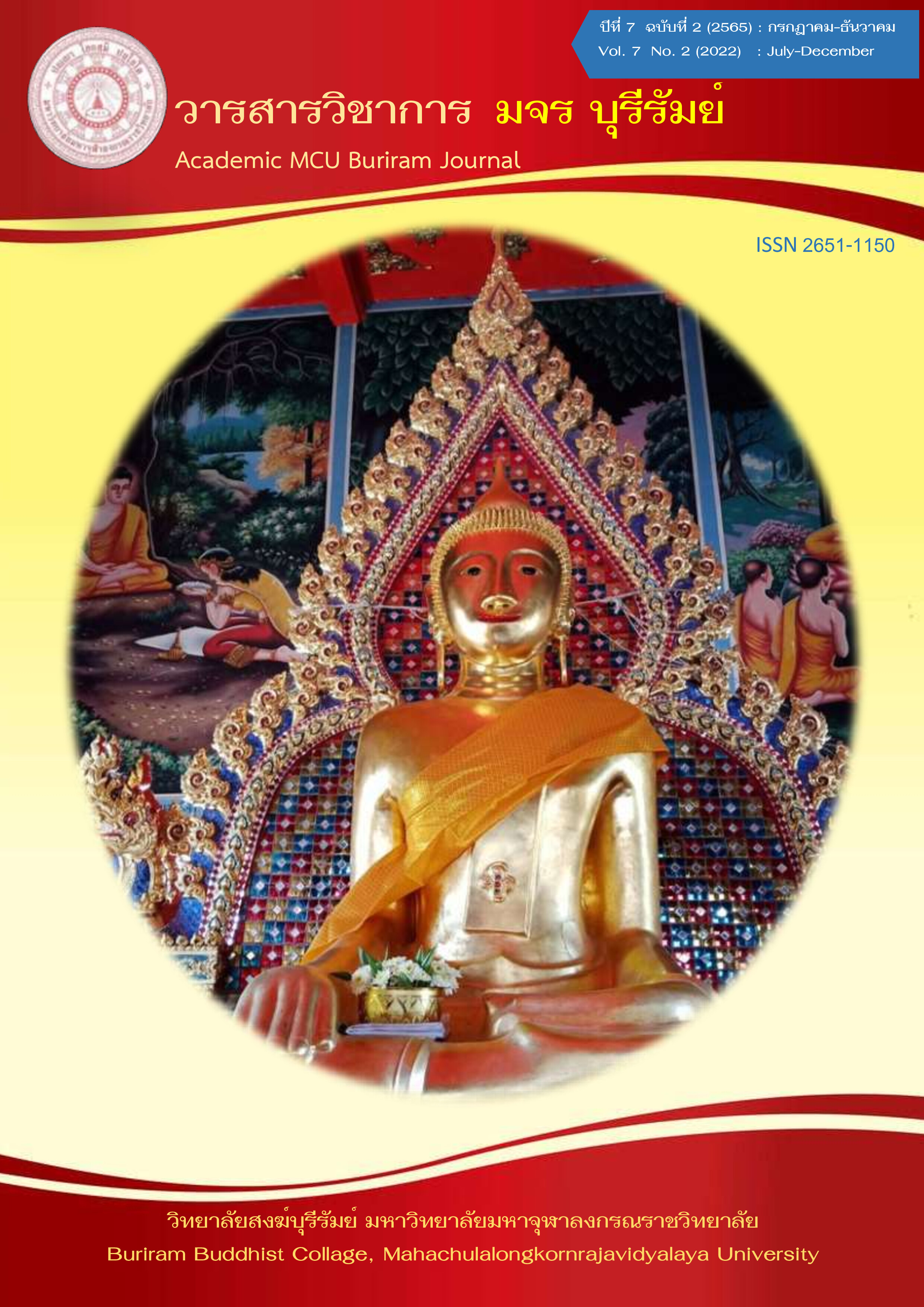An Application of Buddhist Volunteer to Village Health Volunteer of Samed Sub-District, Muang Buriram District, Buriram Province
Keywords:
Application, Buddhist Volunteer, Village Health Volunteer, Buriram ProvinceAbstract
This research aims 1) to study of volunteer in Theravada Buddhism, 2) to study the problem of volunteer work of village health volunteers and 3) to apply the loving kindness (metta) and compassion (karuna) for work of village health volunteers of Samet sub-district, Muang District, Buriram Province. This research is a qualitative research in fieldwork by interviewing 35 sample people including; village health volunteers, the officials of Tumbon Health Promoting Hospital, village headmen and people of Samet sub-district, Muang District, Buriram Province. The data were used an analytical descriptions.
The research result finds that:
1. The Buddhist principles for promoting volunteer work are 1) loving kindness (metta); meaning goodwill for human and 2) compassion (karuna); meaning to saving wish others from suffering. 2. The working problem of village health volunteers is that some volunteers do not work with love, do not have ideology, do not have health-leading, do not sacrifice to work and neglect their duties. Also, the work of village health volunteers is over load because of increasing of the elders and the epidemic. The compensation of village health volunteers is less and is not enough for travelling expenditure. The village health volunteers lacked of loving kindness (metta) because they do not really understand the meaning of volunteer in Buddhism. They should deeply realize the principle of loving kindness (metta) and compassion (karuna). 3. The application of loving kindness (metta) for village health volunteer work is that they should have mercy and help humans to be happy. Their work should focus on helping human without reward. The example can study from the story of the Buddha and his disciples. And, the application of compassion (karuna) for village health volunteer work is that they should act for others without reward or paying wages. The aim of compassion (karuna) is as same as loving kindness (metta). For the difference, loving kindness (metta) is just an idea that does not change to concrete object, but compassion (karuna) changes the state of effect to be concrete object.
References
ไจตนย์ ศรีวังพล. (2552). ศึกษาการประยุกต์หลักพุทธธรรมในการทำงานจิตอาสาของอาสาสมัคร สวพ. 91. วิทยานิพนธ์พุทธศาสตรมหาบัณฑิต สาขาวิชาพุทธศาสตร์และศิลปะแห่งชีวิต. บัณฑิตวิทยาลัย: มหาวิทยาลัย มหาจุฬาลงกรณมหาวิทยาลัย.
นัฏจภัส มธุรส. (2549). การปฏิบัติงานตามบทบาทหน้าที่ของอาสาสมัครสาธารณสุขประจำหมู่บ้านในค่ายนวมินทราชินี อำเมือง จังหวัดชลบุรี. ปริญญารัฐประศาสนศาสตรมหาบัณฑิต สาขาวิชานโยบายสาธารณะ. วิทยาลัยการบริหารรัฐกิจ มหาวิทยาลัยบูรพา.
พระก๋อมสอร์ท โชติรกฺขิโต (สวน). (2552). การศึกษาลักษณะจิตอาสาในพระพุทธศาสนาเถรวาท: กรณีศึกษานิสิตปฏิบัติศาสนกิจมหาวิทยาลัยมหาจุฬาลงกรณราชวิทยาลัย. วิทยานิพนธ์พุทธศาสตรมหาบัณฑิต สาขาชีวิตและความตาย. บัณฑิตวิทยาลัย: มหาวิทยาลัยมหาจุฬาลงกรณราชวิทยาลัย.
มหาจุฬาลงกรณราชวิทยาลัย. (2539). พระไตรปิฎกภาษาไทย ฉบับมหาจุฬาลงกรณราชวิทยาลัย. กรุงเทพมหานคร: โรงพิมพ์มหาจุฬาลงกรณราชวิทยาลัย.
AS Hornby. (2005). Oxford Advanced Learner’s Dictionary. 7th Edition. Oxford: Oxford University Press.
ข่าวในพระราชสำนัก. (10 กรกฎาคม 2513). http://www.ch7.com/news/news-speech.aspx (สืบค้นเมื่อ 10 ตุลาคม 2563).
Downloads
Published
How to Cite
Issue
Section
License
Copyright (c) 2022 Academic MCU Buriram Journal

This work is licensed under a Creative Commons Attribution-NonCommercial-NoDerivatives 4.0 International License.
ทัศนะและความคิดเห็นที่ปรากฏในบทความวารสารฉบับนี้ถือเป็นความรับผิดชอบของผู้เขียนบทความนั้น ไม่ถือเป็นทัศนะและความรับผิดชอบของบรรณาธิการ





